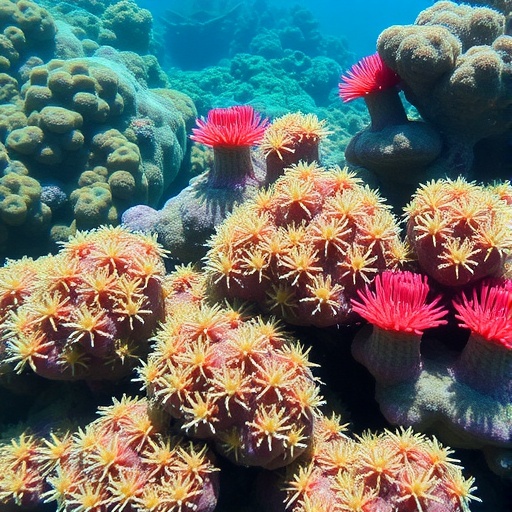In a groundbreaking new study published in The Science of the Total Environment, researchers from the Hebrew University and the Interuniversity Institute for Marine Sciences in Eilat have unveiled compelling evidence of extraordinary thermal resilience in the corals of the Gulf of Aqaba (GoA). This exceptional resilience was demonstrated as the corals endured four consecutive years of escalating marine heatwaves, climaxing in 2024 with the most extreme thermal stress ever recorded globally. The findings shed critical light on a rare natural refuge that may hold keys to coral survival in an era of rapid and relentless climate change.
Coral reefs worldwide have been subjected to a relentless barrage of environmental stress factors, chief among them rising ocean temperatures driven by climate change. Marine heatwaves, prolonged periods during which sea surface temperatures elevate far beyond seasonal averages, have become increasingly frequent and severe. These spikes in temperature often trigger widespread coral bleaching events, leading to mass mortality and ecosystem collapse. Against this global backdrop of decline, the resilience displayed by the GoA corals stands out as a beacon of hope and a subject of intense scientific interest.
The 2024 marine heatwave that raged across the Gulf of Aqaba was unprecedented in both duration and intensity. Persisting for an astonishing 113 days, the heatwave pushed sea surface temperatures to a peak of 32.6°C. This exceeded the regional average by 3.4°C, subjecting the corals to a thermal stress magnitude quantified as 30 Degree Heating Weeks (DHWs)—a measurement that reflects cumulative heat stress and is recognized as the highest recorded level worldwide for that year. These extreme conditions typically spell disaster for coral ecosystems, yet the GoA corals showed remarkable resistance.
Five species examined in the study survived this record-breaking event without exhibiting the catastrophic mass bleaching observed elsewhere. The researchers meticulously assessed physiological and biochemical parameters to understand the underlying mechanisms of this resilience. Notably, the corals maintained stable energy reserves despite the thermal stress, with symbiotic algae (zooxanthellae) within the coral tissues exhibiting elevated carbohydrate levels during the 2024 event compared to previous years. This suggests an adaptive metabolic response supporting energy homeostasis under heat stress.
Among the species evaluated, those belonging to the genus Porites demonstrated striking metabolic stability, showing limited physiological disturbance throughout the heatwave. Conversely, Cyphastrea species experienced measurable stress but exhibited a remarkable capacity to recover within months post-heatwave. These species-specific responses underscore the complex and nuanced ways corals respond to thermal anomalies, with genetic and ecological factors likely contributing to resilience profiles.
Despite these promising signs of tolerance, the study warns that this resilience is not absolute. Sporadic instances of shallow bleaching were documented, signaling that the Gulf of Aqaba’s corals may be approaching their thermal threshold. The researchers caution that the refuge provided by the GoA is fragile, vulnerable to the combined effects of accelerating climate warming and local anthropogenic disturbances such as pollution and coastal development. This dual-threat scenario underscores the urgency of implementing effective conservation strategies.
The Gulf of Aqaba’s unique oceanographic and climatic conditions contribute to its status as a thermal refuge. Its deep waters and strong water circulation patterns facilitate temperature regulation, creating an environment where corals have historically avoided the worst of marine heatwave impacts. Understanding these local factors could prove invaluable in global efforts to identify or even engineer refuges capable of sustaining coral biodiversity under future climate scenarios.
Significantly, the study’s insights extend beyond ecological observation. By illuminating physiological adaptations within coral-symbiont systems that bolster energy stability under extreme heat, it opens potential pathways for biotechnological or restoration approaches. For instance, selective breeding or assisted gene flow targeting traits found in GoA corals could enhance the thermal tolerance of vulnerable reefs worldwide.
However, the researchers contend that such scientific advances alone cannot safeguard coral reefs long-term without complementary climate mitigation policies. The Gulf of Aqaba’s resilience, while encouraging, is not a carte blanche to delay urgent greenhouse gas emissions reductions globally. Rather, it highlights the need for an integrated approach coupling regional conservation initiatives with aggressive climate action to protect these ecosystems’ intrinsic value.
Prof. Maoz Fine, co-author of the study, emphasized the dual message of hope and caution: “Our findings reveal that while the Gulf of Aqaba harbors one of the last naturally resilient coral refuges, this rarity carries great responsibility. Without immediate conservation interventions, even these strongholds risk succumbing to the relentless advance of climate change.”
Coral reefs are foundational to marine biodiversity, supporting thousands of marine species and sustaining human communities through fisheries, tourism, and coastal protection. As such, the implications of this research extend beyond scientific circles, bearing profound socio-economic significance. The survival of GoA corals could inform global coral reef management paradigms and serve as a natural laboratory for exploring thermal resilience mechanisms under extreme environmental pressures.
In conclusion, the study makes a vital contribution to coral reef science by documenting natural resilience in the face of unprecedented thermal stress and elevating the Gulf of Aqaba as a critical refuge worthy of protection. However, it simultaneously sounds an alarm about the fragility of these systems and the narrow window available to act before such refuges potentially vanish. This research sets a new benchmark for understanding coral bleaching dynamics and signals a pressing need to harness this knowledge in concerted conservation and climate strategies worldwide.
Subject of Research: Animals
Article Title: Gulf of Aqaba as a thermal refuge: Insights from four years of intensifying marine heatwaves
News Publication Date: 16-Sep-2025
Web References: DOI: 10.1016/j.scitotenv.2025.180463
Image Credits: Maoz Fine
Keywords: Marine conservation, Ecosystem management, Conservation ecology, Applied ecology, Natural disasters, Oceanography




